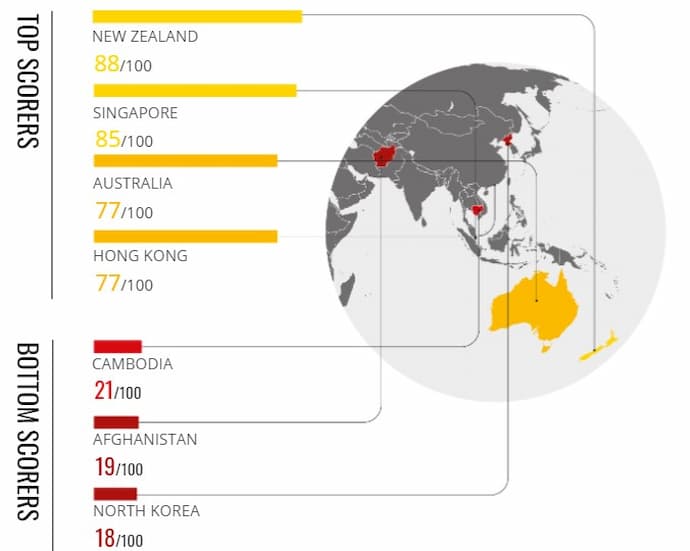Cambodian ranking on 2020 Corruption Perception Index
Cambodia ranked one place better on the 2020 Corruption Perception Index but was still the worst-ranked of the ASEAN nations.
The Transparency International’s (TI) Corruption Perception Index (CPA) gave the Kindom of Cambodia a rating of 21 out of 100 in 2020.

How does the Corruption Perception Index work?
The index ranks 180 countries and territories by "their perceived levels of public sector corruption according to experts and businesspeople, uses a scale of zero to 100, where zero is highly corrupt and 100 is very clean."
More than two-thirds of countries scored below 50 on the 2020 CPI, with an average score of just 43. The Transparency International claims "data shows that despite some progress, most countries still fail to tackle corruption effectively."
2020 Corruption Perception Index
The top countries on the CPI in 2020 are Denmark and New Zealand, with scores of 88. They were followed by Finland, Singapore, Sweden and Switzerland, with scores of 85 each. At the bottom end of the scale, South Sudan and Somalia, scored 12 each, followed by Syria (14), Yemen (15) and Venezuela (15).
How did Cambodia rank on the 2020 Corruption Perception Index?
TI said of Cambodia: “From a regional perspective, Cambodia continues to occupy the third lowest spot in the Asia Pacific, coming above only Afghanistan and North Korea, and the lowest spot in the ASEAN region. The results obtained by other ASEAN countries have been mixed." Cambodia ranked 160 out of the 180 countries involved. The average score in the Asia Pacific region was 45. In terms of some of the other ASEAN nations, they scored as:
- Singapore (85)
- Brunei (60)
- Malaysia (51)
- Philippines (34)
- Laos (29)
- Myanmar (28)
A press release from TI said: "Cambodia’s results reflect some progress the country has made, including in its efforts to reduce corruption in the private sector, reform public financial management mainly through the strengthening of resource mobilisation, foster e-government and improve public services, particularly in response to Covid-19. The improvement, however, has not changed the overall perception of experts and business executives, particularly when key structural and systematic reforms that seek to tackle grand and political corruption and strengthen the rule of law are deemed to have made little to no progress." The recommendations from the Transparency International’s Corruption Perception Index for Cambodia included:
- Amending articles in the Anti-Corruption Law, especially concerning public officials declaring assets.
- Laws to protect whistleblowers
- Grant access to information
- Enabling the participation of civil society organisations, media personnel and citizens to fight corruption
- Public access to taxpayer information for tax collections.
- Strengthening the institutions responsible for promoting the rule of law and address the gaps in the implementation of anti-corruption legislation.
- Improving the business environment and promoting fair business competition by reducing bureaucratic burdens, promoting equal compliances and eliminate all forms of corruption which are the main barriers of doing business in Cambodia.
- Establishing accountability mechanisms and ensure checks and balances at both the national and sub-national levels.
- Enhancing effectiveness and independence of oversight institutions such as the parliament, the National Audit Authority, the Constitutional Council and the Anti-Corruption Unit.
According to the Phnom Penh Post, the Cambodian government officials have dismissed the rating "as not reflective of the reality in the country." Government spokesman Phay Siphan said on January 28, 2021, that Cambodia was not interested in TI’s ranking because it was not an accurate depiction of the Kingdom, nor did it affect investments in the country according to the PP Post.
You can see more about the highlights of the 2020 report here.